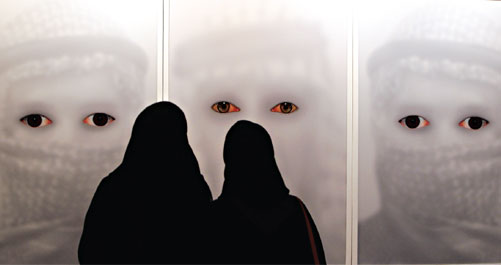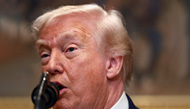▶ Bars were kept open to avert uprisings akin to Egypt’s.

Even Moqtada al-Sadr, the fiery Iraqi cleric, says women should be free not to wear full-face veils. A Dubai exhibit of ‘‘Witness From Baghdad,’’ by Halim al-Karim.
So goes the struggle to define Iraq’s emergent democracy and whether it can balance religion and secularism. If the issue of alcohol offers any clues, the effort remains a work in progress.
Iraq serves as a volatile laboratory for testing how Islamic a democracy can be, and vice versa. The strict Islamists have not won yet, and this may point to a couple of tentative lessons.
In January, bars and clubs, including the Writers Union, were raided in what many Iraqis saw as a government move toward a stricter interpretation of Islamic law. But soon after, as protests for reform began about other issues, the boozy haunts were allowed to reopen. And since then, Baghdad has seen a surprising renaissance of its night life.
It hasn’t been the only sign here this year of a tilt away from Islam, and toward a more expansive view of personal freedoms. The new education minister reopened art and music classes that the previous minister had banned. An attempt to require female government employees to wear a veil was blocked in Parliament. Even Moqtada al-Sadr, the anti-American cleric, responded to France’s ban on fullface veils for women with a statement that sounded remarkably like an embrace of democratic tolerance: “According to Muslim law, it is not an obligation to wear the niqab, or not to wear it, both are unacceptable.”
A constitution with places for Islam and democracy is not necessarily an oxymoron. But the effort to find a balance between them makes for much pushing and shoving, and will test the strength of the democracy. In fact, both Islam and democracy are enshrined in the constitution that Americans helped write six years ago.
Lately, the seesaw has been tilting away from strict Islam , but the militant Islamic fringe retains the option of violence if its lawmakers don’t prevail; even now, liquor stores are frequently hit with explosions.
“The big problem faced by Iraq is not Islam and democracy, but divisions in the body politic and the state,” said Noah Feldman, a Harvard Law School professor who advised the Coalition Provisional Authority on writing the constitution .
In late February, inspired by uprisings by Arabs elsewhere, Iraqis held their own protests in Baghdad’s Tahrir Square . They were attacked by security forces, and the protests did not blossom nationally. But it appears that one accommodation the authorities made was to dial back the crackdown on night life .
“In the context of every other country in the Middle East, with the rise of the Muslim Brotherhood and in Tunisia, we are going to see elections where Islamic parties are going to play a part,” said Professor Feldman. “Iraq provides a model for how devoted Islamic parties that say they are committed to democracy are embedded in a constitutional order that guarantees Islam and democracy.”
The alcohol issue is only one aspect of how Islamic and secular values can clash. Much graver matters are at stake, like the status of women, domestic violence, the scope of the law itself and the nature of punishment for violating it. But the way the liquor issue has begun to play out offers at least a peek at what could lie ahead in mediating the broader debate.
“Banning alcohol does not contradict the fundamentals of democracy,” said Professor Feldman. “That’s a political question of how Islamic the state should be.” The interesting thing about Iraq, he said, is that “in no other place in the Middle East is that a subject for debate, for articles, and for voting. It should be, and is, a lively topic for democratic debate.”
The issue is also being sorted out within another piece of constitutional territory: federalism. “In the Kurdish areas, no one is banning alcohol,” said Professor Feldman, referring to the northern region that enjoys significant independent powers . “In areas where Shias dominate, there is an effort.”
Few voices here advocate a Western notion of strict separation of religion and state, and even avowedly secular politicians like Ayad Allawi, a Shiite who led a Sunni-influenced coalition to victory in last year’s parliamentary elections, accommodate a role for Islam in politics.
“Faith is faith,” Mr. Allawi said in a recent interview. “It is something between the individual and God. I think the inspiration for the constitution should come from the culture of the region, and an important part, a significant part of the culture is Islam.”
These days, though, the political currents seem to be running against strict Islamic conduct, and night life in the capital has become more rambunctious and free-spirited than many people can remember. Thursday and Friday nights are one long scene of drunken revelry on Abu Nuwas Street, a riverfront promenade named for an Arab-Persian poet and legendary drinker who was gay and delighted in writing on topics that offended strict Islamists. So perhaps it is a small measure of Iraq’s progress away from warring with itself that officers manning a checkpoint on Abu Nuwas Street recently seemed to worry more about drunks than about bombs.
“The government opened the nightclubs and liquor stores again because of the headache that the protesters are causing,” said one officer, Salem Abbas. “Instead of gathering and creating problems in Al Tahrir Square, now there is always fighting between the drunk people in the street and inside the clubs. We have to be in a state of emergency all night.”
By TIM ARANGO
스마터리빙
more [ 건강]
[ 건강]이제 혈관 건강도 챙기자!
[현대해운]우리 눈에 보이지 않기 때문에 혈관 건강을 챙기는 것은 결코 쉽지 않은데요. 여러분은 혈관 건강을 유지하기 위해 어떤 노력을 하시나요?
 [ 건강]
[ 건강]내 몸이 건강해지는 과일궁합
 [ 라이프]
[ 라이프]벌레야 물럿거라! 천연 해충제 만들기
 [ 건강]
[ 건강]혈압 낮추는데 좋은 식품
[현대해운]혈관 건강은 주로 노화가 진행되면서 지켜야 할 문제라고 인식되어 왔습니다. 최근 생활 패턴과 식생활의 변화로 혈관의 노화 진행이 빨라지고
사람·사람들
more많이 본 기사
- ‘헉’ 오바마케어 보험료가 연 4만불?
- ‘남가주 사랑의 교회’ 이원준 담임목사 부임
- 가주서 노동법 위반 업주 처벌 대폭 ‘강화’
- 에어프랑스 엔진 화재 5천피트 급강하 ‘아찔’
- CBS ‘트럼프 눈치보기’?… ‘이민자 추방’ 보도 취소
- 수학강사 맞아? 류시원♥ 19세 연하 아내, 민폐하객 미모 보니
- 엡스타인 파일서 지웠던 트럼프 사진 복원
- 중국 시온교회 목회자 체포… 미주 한인교계 등 ‘기도와 지원’
- 교황, 교황청 권력다툼 경고 “성탄의 교훈은 겸손” 연설
- 악명 높은 갱단 연루 한인 기소
- 법정구속 오열→불복..박수홍 친형 부부, 기어이 대법원으로
- LAPD “툭하면 발포”… 경관 총격 사건 올들어 급증
- 뉴욕총영사관 이전 1월 중순으로 연기
- ‘K-도넛’, 남가주 진출·본격 확장
- [이태리 패션타운] “신사의 품격 되찾아 주는 명품 양복”
- 홍진영, 주사이모와 찍은 사진에 “12년 전 촬영, 친분 없다”
- 크리스마스 앞두고 막판 트리 준비
- 남가주 사랑의교회 노창수 목사 은퇴식
- 소희 떠나고 선미..10년 전 원더걸스 ‘국민 걸그룹’ 시절 “보고 싶다”
- 재외공관들 성탄연휴 휴무 ‘제각각’
- [젬텍] 반세기 보석 명가… 연말 감사 할인행사
- [어원] 한 상 가득한 풍성한 나눔의 기쁨
- 1,480원까지 돌파한 환율… “내년에도 고공 행진”
- 샌프란시스코 대규모 정전 사태… 이틀만에 정상화
- 가족 얼굴 못 알아보고 성격 변한 부모님… “서양 기준으론 정상?”
- 연말 여행객 최다… LAX 공항 ‘대혼잡’
- 국방부 인·태 차관보 한인 존 노 인준 통과
- ‘크리스마스 캐롤’과 산타 클로스 1
- 한인 박찬영씨 교통시비 총격 사망...타코마중앙장로교회 40대 장로, 19일 레이시 도로서 참변
- 트럼프, 그린란드 특사 임명… 덴마크 “우리 영토” 반발
- 사사세 워싱턴 송년회
- ‘트럼프 골드 카드’ 1300명 이상 신청
- 20%만 “트럼프 덕에 살림살이 나아졌다”
- 가주에서 2026년에 시행되는 새 노동법 법안들
- 윤미래, 알앤비 신곡 ‘숨’…남편 타이거JK와 작사·작곡
- 베네수엘라 봉쇄에 금·은 값 또 최고
- 애난데일 인근 I-495에서 28중 추돌사고, 8명 부상
- AI로 가속화되는 노동시장 개편
- 맥도널드 주차장서 싸움 끝 총격
- “기부잔여신탁(CRT)의 놀라운 힘”
- 운전중 시비 끝에 총 맞아 40대한인 사망
- 뉴욕시 합법 노점상 확대 조례안 통과⋯5년간 2만개 늘려
- 우리어덜트데이케어, 연말파티
- 한인은행 신용도 ‘최우수’… 대다수 ‘별 5개’ 평가
- 젤렌스키, 마이애미 종전협상에 “실질적 결과에 매우 근접”
- ‘경악’ 오타니 골드카드 300만 달러에 낙찰! 슈퍼스타 위엄, KBO 최고연봉도 넘었다
- 트럼프 “마두로, 물러나는게 현명…강하게 나오면 그게 마지막”
- JGL 건설회사 송년회… 장학금 전달
- 올해 메릴랜드 교도소 수감자 약 70명 숨져
- 올해 AI로 전국 일자리 5만5,000개 증발
1/5지식톡

-
 미 육군 사관학교 West Poin…
0
미 육군 사관학교 West Poin…
0https://youtu.be/SxD8cEhNV6Q연락처:wpkapca@gmail.comJohn Choi: 714-716-6414West Point 합격증을 받으셨나요?미 육군사관학교 West Point 학부모 모…
-
 ☝️해외에서도 가능한 한국어 선생님…
0
☝️해외에서도 가능한 한국어 선생님…
0이 영상 하나면 충분합니다!♥️상담신청문의♥️☝️ 문의 폭주로 '선착순 상담'만 진행합니다.☎️ : 02-6213-9094✨카카오톡ID : @GOODEDU77 (@골뱅이 꼭 붙여주셔야합니다…
-
 테슬라 자동차 시트커버 장착
0
테슬라 자동차 시트커버 장착
0테슬라 시트커버, 사놓고 아직 못 씌우셨죠?장착이 생각보다 쉽지 않습니다.20년 경력 전문가에게 맡기세요 — 깔끔하고 딱 맞게 장착해드립니다!장착비용:앞좌석: $40뒷좌석: $60앞·뒷좌석 …
-
 식당용 부탄가스
0
식당용 부탄가스
0식당용 부탄가스 홀세일 합니다 로스앤젤레스 다운타운 픽업 가능 안녕 하세요?강아지 & 고양이 모든 애완동물 / 반려동물 식품 & 모든 애완동물/반려동물 관련 제품들 전문적으로 홀세일/취급하는 회사 입니다 100% …
-
 ACSL 국제 컴퓨터 과학 대회, …
0
ACSL 국제 컴퓨터 과학 대회, …
0웹사이트 : www.eduspot.co.kr 카카오톡 상담하기 : https://pf.kakao.com/_BEQWxb블로그 : https://blog.naver.com/eduspotmain안녕하세요, 에듀스팟입니다…
케이타운 1번가
오피니언
 조환동 / 편집기획국장·경제부장
조환동 / 편집기획국장·경제부장 AI로 가속화되는 노동시장 개편
 민경훈 논설위원
민경훈 논설위원‘크리스마스 캐롤’과 산타 클로스
 정재민 KAIST 문술미래전략 대학원 교수
정재민 KAIST 문술미래전략 대학원 교수 [정재민의 미디어풍경] 적과의 동침, 협력하며 경쟁하기
 김영화 수필가
김영화 수필가 [화요칼럼] 단호박의 온기
 김정곤 / 서울경제 논설위원
김정곤 / 서울경제 논설위원[만화경] 안중근의사 유해봉환 사업
 권지숙
권지숙 오후에 피다
 옥세철 논설위원
옥세철 논설위원말살되고 있는 유럽의 성탄절 전통, 그 원인은…

외로운 이웃들
 조지 F·윌 워싱턴포스트 칼럼니스트
조지 F·윌 워싱턴포스트 칼럼니스트 [조지 F. 윌 칼럼] MIT에 대한 트럼프의 무분별한 공격
1/3지사별 뉴스

빅애플 2025년 송년회
빅애플(대표 여주영)은 지난 19일 퀸즈 베이사이드 소재 산수갑산2 연회장에서 2025년 송년회를 열고 회원들간 화합과 친목을 도모했다. 이날…
재미 한인이산가족 상봉 길 열렸다

미주한인 이산가족 북한 고향 길 열려
“그리워하면 언젠가 만나게 되는…” 노래 가사처럼 그리워하면 다시 만날 수 있을까. 재미한인이산가족들은 그렇게 그리워하며 반세기가 넘게 기다리…
워싱턴 메트로지역 5세이하 아동인구 20년새 1.8%⇩

연말 ‘로드레이지’ 비극… 한인 총격 피살
연말을 맞아 도로 위에서 순간적으로 벌어진 운전 중 시비가 40대 한인 가장의 총격 피살 비극으로 이어졌다. 워싱턴주 레이시 경찰국과 서스턴 …
엡스타인 파일 공개 다음날 트럼프 사진 삭제…야당서 탄핵 경고

오늘 하루 이 창 열지 않음 닫기 





















































.png)


댓글 안에 당신의 성숙함도 담아 주세요.
'오늘의 한마디'는 기사에 대하여 자신의 생각을 말하고 남의 생각을 들으며 서로 다양한 의견을 나누는 공간입니다. 그러나 간혹 불건전한 내용을 올리시는 분들이 계셔서 건전한 인터넷문화 정착을 위해 아래와 같은 운영원칙을 적용합니다.
자체 모니터링을 통해 아래에 해당하는 내용이 포함된 댓글이 발견되면 예고없이 삭제 조치를 하겠습니다.
불건전한 댓글을 올리거나, 이름에 비속어 및 상대방의 불쾌감을 주는 단어를 사용, 유명인 또는 특정 일반인을 사칭하는 경우 이용에 대한 차단 제재를 받을 수 있습니다. 차단될 경우, 일주일간 댓글을 달수 없게 됩니다.
명예훼손, 개인정보 유출, 욕설 등 법률에 위반되는 댓글은 관계 법령에 의거 민형사상 처벌을 받을 수 있으니 이용에 주의를 부탁드립니다.
Close
x